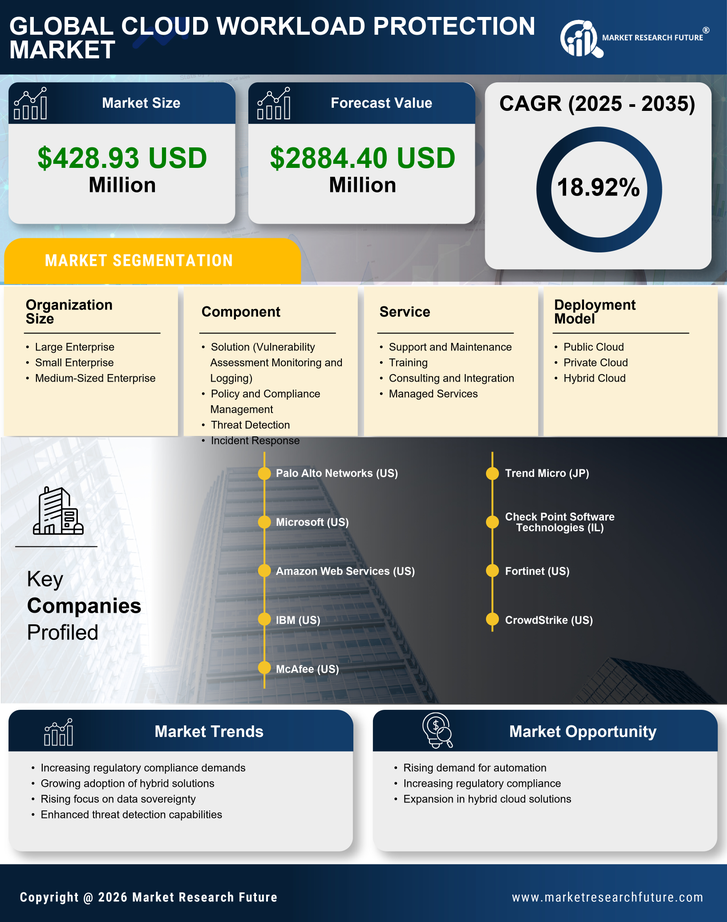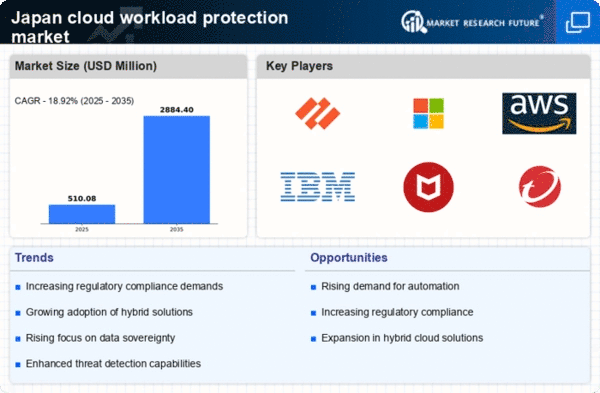Increased Cloud Migration
The trend of migrating to cloud-based solutions is accelerating among Japanese enterprises, driven by the need for scalability and flexibility. As organizations transition their workloads to the cloud, the demand for effective protection mechanisms becomes paramount. The cloud workload-protection market is poised for growth as businesses seek to secure their cloud environments against potential threats. In 2025, it is projected that over 70% of Japanese companies will have adopted cloud services, highlighting the urgency for robust security measures. This migration not only enhances operational efficiency but also necessitates a comprehensive approach to workload protection, thereby fueling market expansion.
Shift Towards Remote Work
The transition to remote work has fundamentally altered the operational landscape for many organizations in Japan. This shift has necessitated a reevaluation of security protocols, particularly concerning cloud workloads. As employees access corporate resources from various locations, the risk of data exposure increases. Consequently, the cloud workload-protection market is witnessing a surge in demand for solutions that ensure secure access and data integrity. Reports suggest that by 2025, remote work could account for over 30% of the workforce in Japan, further driving the need for comprehensive protection strategies. Organizations are increasingly investing in cloud workload protection to mitigate risks associated with remote access, thereby enhancing their overall security posture.
Growing Regulatory Landscape
Japan's regulatory environment is evolving, with stricter data protection laws being implemented to safeguard consumer information. The cloud workload-protection market is significantly influenced by these regulatory changes, as organizations must comply with various legal requirements. The Personal Information Protection Act (PIPA) mandates that businesses take appropriate measures to protect personal data, which includes securing cloud workloads. As compliance becomes a priority, companies are likely to allocate more resources towards cloud workload protection solutions. This trend suggests that the market will continue to grow as organizations seek to align their security practices with regulatory expectations, ensuring they avoid potential fines and reputational damage.
Rising Cybersecurity Threats
The cloud workload-protection market in Japan is experiencing heightened demand due to the increasing frequency and sophistication of cyber threats. Organizations are recognizing the necessity of robust security measures to safeguard their cloud environments. In 2025, it is estimated that cybercrime could cost businesses globally over $10 trillion annually, prompting Japanese companies to invest significantly in cloud workload protection solutions. This trend indicates a growing awareness of the vulnerabilities associated with cloud computing, leading to a surge in the adoption of advanced security technologies. As a result, the cloud workload-protection market is likely to expand as businesses prioritize the protection of sensitive data and critical workloads against potential breaches.
Emergence of Advanced Technologies
The integration of advanced technologies such as artificial intelligence (AI) and machine learning (ML) is transforming the cloud workload-protection market in Japan. These technologies enable organizations to enhance their security measures by providing real-time threat detection and response capabilities. As businesses increasingly adopt AI-driven solutions, the effectiveness of cloud workload protection is likely to improve significantly. By 2025, it is anticipated that AI-based security solutions will account for a substantial portion of the market, reflecting a shift towards more proactive security strategies. This trend indicates that organizations are not only focusing on compliance but are also leveraging technology to bolster their defenses against evolving cyber threats.

















